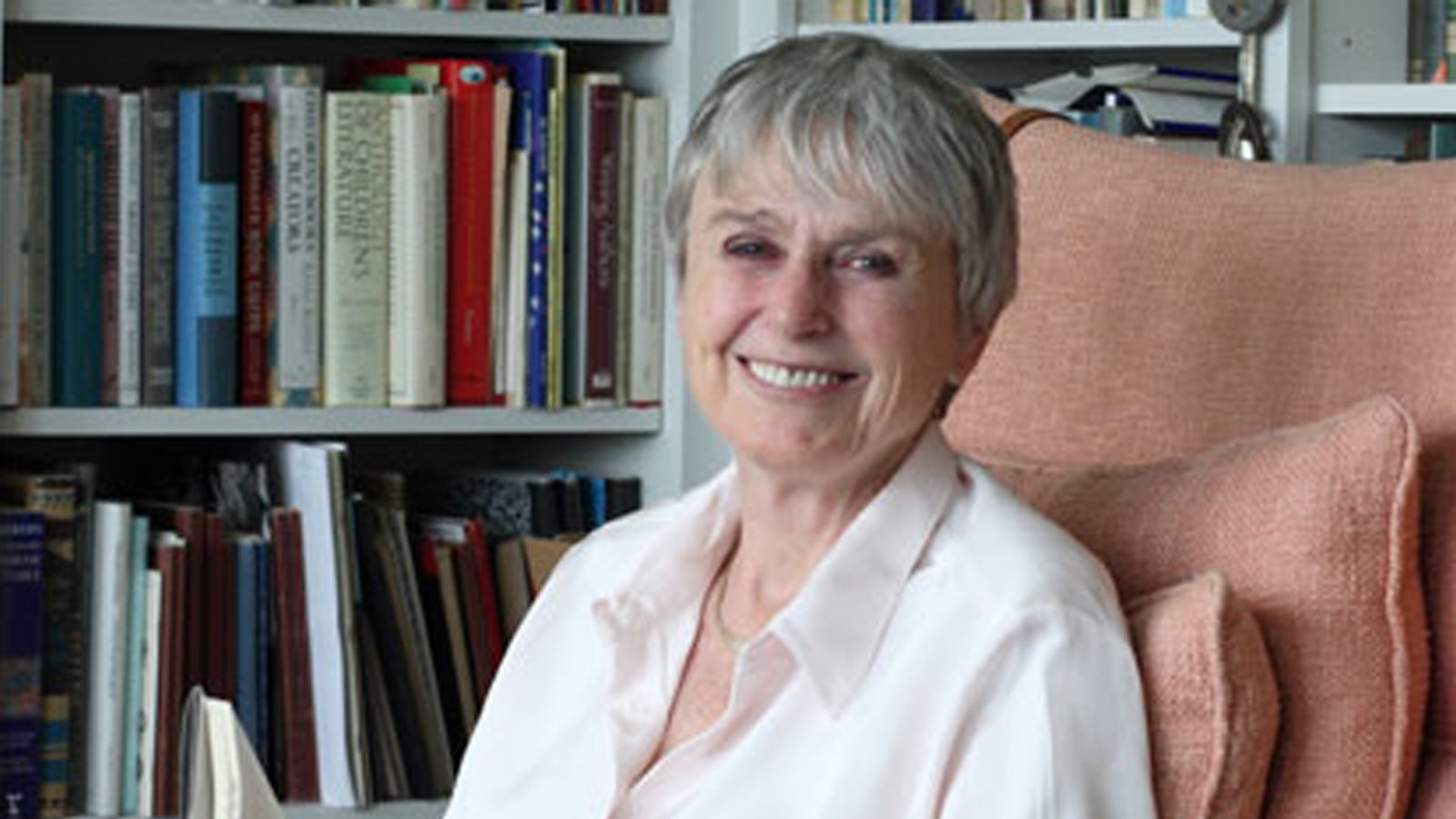If Susan Cooper’s name is new to U.S. readers, it’s only because her previous novels have been set in Britain—notably The Dark Is Rising Sequence, a towering landmark on the road from J.R.R. Tolkien to J.K. Rowling. In fact, she has lived most of her life in New England, where she moved in 1963 to marry an M.I.T. professor.

“My imagination is rooted in Britain, and always will be,” says 78-year-old Cooper. “It’s like the fact that I’ve lived in the U.S.A. for 50 years and don’t have an American accent. But gradually it’s been crossing the Atlantic.” And with Ghost Hawk, her impassioned new novel dealing with the fraught encounter between Puritan settlers and Native Americans, her imagination has definitively made landfall on the coast of America.
But let’s go back in time—a compulsion of Cooper’s—to childhood in a house outside London during the Blitz of 1940-41, when her nightmares of German paratroopers bursting through the door seemed all too feasible. She began writing stories aged 8, but it wasn’t until after Oxford—where she attended lectures by Tolkien and C.S. Lewis—that she found herself writing for children.
Initially it was part of her job as a Sunday Times journalist under James Bond author Ian Fleming; then it became an end in itself. Over Sea, Under Stone, about children searching for the Holy Grail of the Arthurian legends, long ago hidden in Cornwall by Celts fleeing the invading Anglo-Saxons, was published in 1965. By then she had moved to America, after falling in love during a four-month reporting trip Stateside.
Transplanted, she craved reconnection with her roots. She set parts of 1973’s The Dark Is Rising in ancient Britain. In this second book of the sequence, 20th-century Will Stanton learns on his 11th birthday that he is the last of the Old Ones, appointed defenders of the Light, and has to seek six signs—quartered circles of wood, bronze, iron, water, fire and stone. (Cooper has distanced herself from the widely panned 2007 movie adaptation, The Seeker.) In the other books, further tokens are gathered against the rising Dark. But the real interest lies in the brilliant interweaving of history and legend (Arthurian, Celtic), in the shadings of morality that belie the simple dualism of Light and Dark, and in the increasingly well-drawn cast.

It was while she was writing the haunting fourth volume, The Grey King, which won the Newbery Medal, that she and her husband met Hume Cronyn at dinner in a Caribbean hotel. When he told his actress wife Jessica Tandy—off in bed with sunburn—she responded, “Not Susan Cooper? She wrote that book I’ve been trying to get you to read for the last six months, The Dark Is Rising.” So began a long collaboration, during which Cronyn and Cooper co-wrote the 1982 Broadway hit Foxfire, for which Tandy won a Tony Award. In 1996, two years after Tandy’s death and 13 after the end of Cooper’s first marriage, she married Cronyn, and they lived in Connecticut until his death in 2003, when she returned to Massachusetts to be near her children.
Ghost Hawk arose like a mist from the estuary salt-marsh on the South Shore where she built her island home. “The place is so extraordinary that it began to haunt me,” she says.
Characteristically, she began to explore its past. “For three years I read every 17th century source and umpteen histories, and became increasingly appalled by the bigotry of the Puritans, who came here to escape persecution and proceeded to persecute others—not just the Indians but also white Christians with beliefs other than their own,” she says. “My imagination took over and gave me two boys, one English, one Pokanoket Indian, and their very dangerous friendship—and this story.” The novel is structurally daring, managing to dovetail the perspectives of both boys. It is also culturally brave, daring to see the world through the eyes of a Native American boy. “You have to pay great respect to the past, especially when one of your characters has an ethnicity different from your own,” she says.
But there are intriguing continuities with The Dark Is Rising and Dawn of Fear. Like Will Stanton, Little Hawk is 11 when ancient ritual and sudden circumstance rob him of his innocence. Likewise the English immigrant John is 11 when he goes off to be apprenticed. When (by supernatural means) he learns the Pokanoket language, astonished Indians call John “the Speaker,” just as Will was “the Seeker.”
Cooper’s Britain has always been marked as a place in danger from invaders, whether they be Germans, Anglo-Saxons, or the agents of the Dark who exploit human hatred, greed and fear. In Ghost Hawk, the “invaders from over the sea” are the English settlers on the Mayflower and later. Their first inadvertent gift is a disease so virulent to the native population that the hero’s entire Pokanoket village is wiped out while he is away enduring a solitary rite of manhood.

Further imports from 17th-century England are religious dogma, guns, and, perhaps most pernicious in Cooper’s view, a sense of ownership. The Pokanoket people honor the land as a mother; but the best hope their leaders can offer is to trade it away for short-term profit or peace: a perversion of the old ways, and a doomed one at that.
The Dark is Rising sequence is a symphonic movement with brilliantly modulated suspense and terror, moving towards the point prophesied when “all shall find the light at last, silver on the tree.” Ghost Hawk, a powerful novel with the hobbled rhythms and stark outcomes of reality, offers no victory achievable by arms or by magic—only an impassioned plea for understanding. It is in the lingering innocence of her young protagonists, and in the human capacity for open-heartedness, that Cooper finds a limited hope. “I don’t think mankind is any darker than it’s always been, but because of mankind’s new capabilities the world is now clearly in greater peril year by year,” she says from her house on the salt-marsh. “The future of this imperfect world is up to you. One person at a time.”






